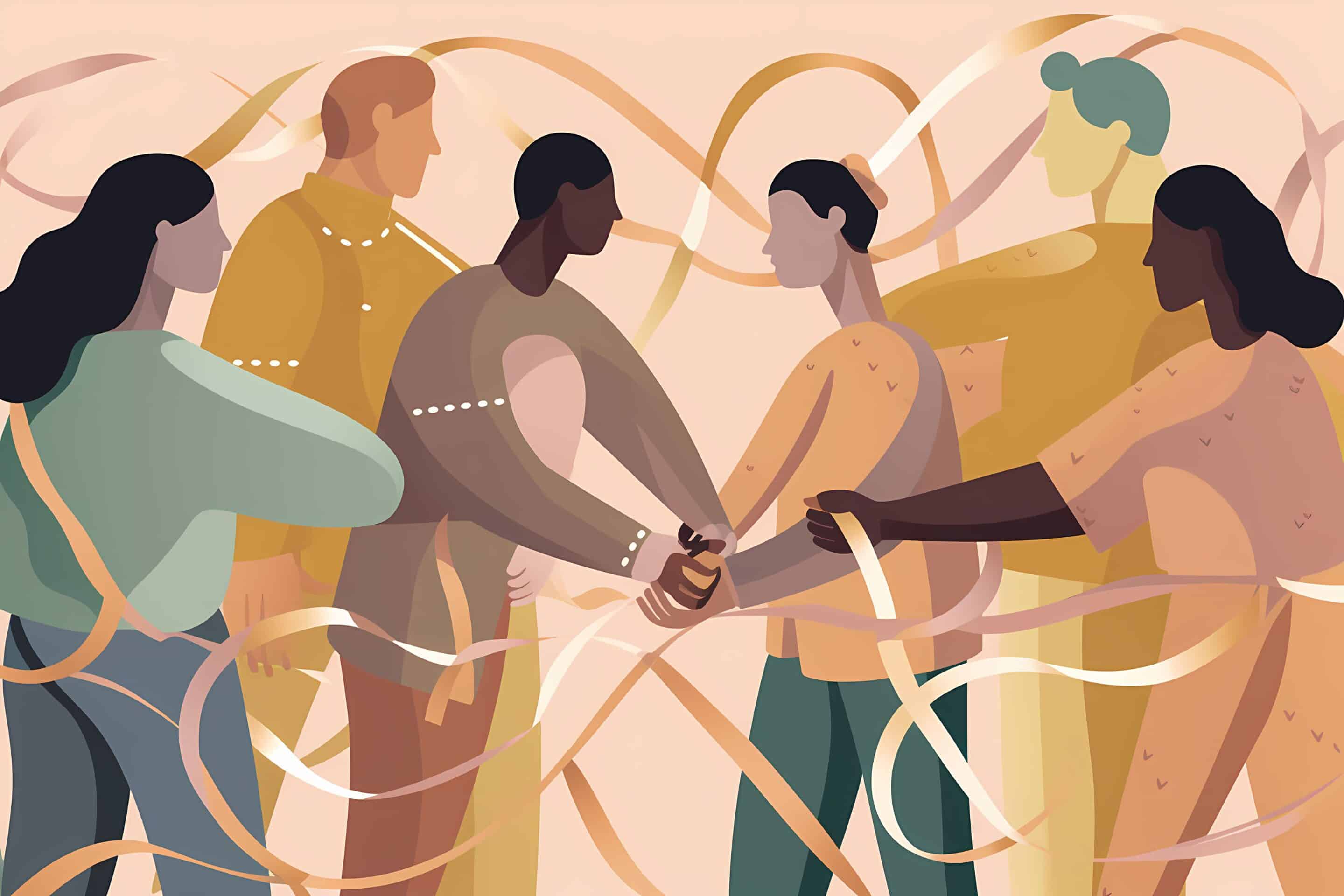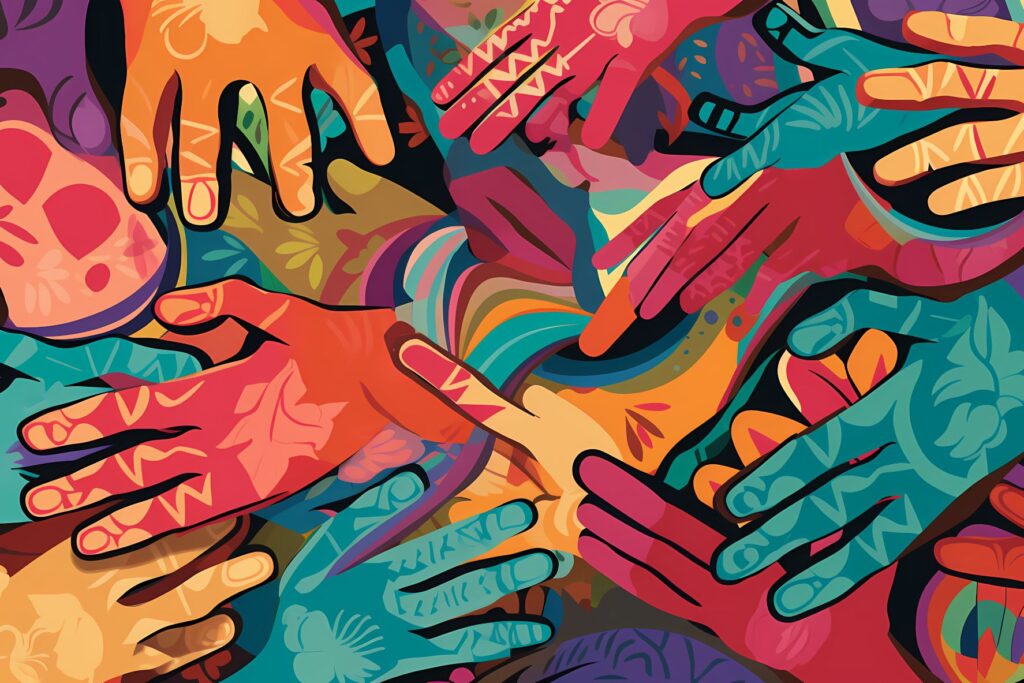Relationship skills are not just about building connections; they are an essential part of our daily lives, influencing personal and professional spheres. In our personal lives, strong relationship skills foster deeper connections with friends and family, leading to a support system vital for mental well-being.
Professionally, these skills enable collaboration, trust, and a positive working environment, contributing to career success. The beauty of relationship skills lies in their universality; whether you are a parent, partner, friend, or colleague, these skills significantly impact how you interact and bond with others.
Aims of the Building Relationships Skills Guide

We’ve created a comprehensive guide to understanding and improving relationship skills. By the end of the post, readers will have a clear understanding of what constitutes relationship skills, why they are essential, and practical ways to enhance them in various life contexts.
Whether you’re looking to strengthen a romantic relationship, develop better connections with colleagues, or become more empathetic and compassionate in your interactions, this article is a starting point that caters to everyone. Join us in exploring these vital skills that can enrich your life and the lives of those around you.
Part I: Understanding Relationship Skills
Defining Relationship Skills
Relationship skills encompass various abilities that allow us to interact positively with others. These skills enable us to establish, maintain, and enhance connections with individuals in different areas of our lives. Here are some key components:
- Communication: Effective communication sets the cornerstone for any successful relationship. Speaking freely includes expressing thoughts and feelings clearly and listening actively to understand others.
- Empathy: Understanding and sharing another person’s feelings and ” putting yourself in their shoes” is essential in building strong connections.
- Trust: Trust is about believing in the reliability and truth of others. The foundation holds relationships together and grows over time with consistency and honesty.
- Respect: Valuing others’ thoughts, feelings, and opinions, even if they differ from our own, fosters a sense of equality and understanding.
- Conflict Resolution: Managing conflicts constructively without letting them deteriorate the relationship is vital for long-term success.
These components are intertwined to form the basis of healthy and thriving relationships.
Why Relationship Skills Matter
Relationship skills are more than just social niceties; they have profound implications for our mental health, happiness, and overall success.
- Mental Health: Strong relationships provide support, reduce stress, and contribute to a sense of belonging and self-worth. They can be a buffer against mental health issues like anxiety and depression.
- Happiness: Healthy relationships increase satisfaction by fulfilling our fundamental human need for connection. They can lead to more enjoyable experiences and a more positive outlook on life.
- Success: In a personal or professional context, relationship skills enable collaboration, teamwork, and mutual growth. They lead to a more productive and harmonious environment in the workplace, contributing to career advancement.
- Wider Societal Impact: On a broader level, cultivating relationship skills leads to a more compassionate and understanding society. It encourages tolerance, cooperation, and community building.
Building Relationship Skills Starts with Understanding Their Crucial Nature
Understanding relationship skills is not just about knowing what they are but recognizing their profound impact on our lives. From personal well-being to professional success, these skills play a lasting role in increasing the quality of our interactions and connections. As we delve deeper into this subject, we will explore how to develop and apply these skills in various aspects of life.
This section sets the foundational understanding of relationship skills, paving the way for the reader to explore more specific aspects in subsequent parts of the blog post. Let me know if you’d like further details or any adjustments!
The Importance of Building Relationship Skills
Relationship skills are not just about building connections; they are an essential part of our daily lives, influencing personal and professional spheres. In our personal lives, strong relationship skills foster deeper connections with friends and family, leading to a support system vital for mental well-being.
Professionally, these skills enable collaboration, trust, and a positive working environment, contributing to career success. The beauty of relationship skills lies in their universality; whether you are a parent, partner, friend, or colleague, these skills significantly impact how you interact and bond with others.
Aims of the Building Relationships Skills Guide
We’ve created a comprehensive guide to understanding and improving relationship skills. By the end of the post, readers will have a clear understanding of what constitutes relationship skills, why they are essential, and practical ways to enhance them in various life contexts.
Whether you’re looking to strengthen a romantic relationship, develop better connections with colleagues, or become more empathetic and compassionate in your interactions, this article is a starting point that caters to everyone. Join us in exploring these vital skills that can enrich your life and the lives of those around you.
Part I: Understanding Relationship Skills
Defining Relationship Skills
Relationship skills encompass various abilities that allow us to interact positively with others. These skills enable us to establish, maintain, and enhance connections with individuals in different areas of our lives. Here are some key components:
- Communication: Effective communication sets the cornerstone for any successful relationship. Speaking freely includes expressing thoughts and feelings clearly and listening actively to understand others.
- Empathy: Understanding and sharing another person’s feelings and ” putting yourself in their shoes” is essential in building strong connections.
- Trust: Trust is about believing in the reliability and truth of others. The foundation holds relationships together and grows over time with consistency and honesty.
- Respect: Valuing others’ thoughts, feelings, and opinions, even if they differ from our own, fosters a sense of equality and understanding.
- Conflict Resolution: Managing conflicts constructively without letting them deteriorate the relationship is vital for long-term success.
These components are intertwined to form the basis of healthy and thriving relationships.
Why Relationship Skills Matter
Relationship skills are more than just social niceties; they have profound implications for our mental health, happiness, and overall success.
- Mental Health: Strong relationships provide support, reduce stress, and contribute to a sense of belonging and self-worth. They can be a buffer against mental health issues like anxiety and depression.
- Happiness: Healthy relationships increase satisfaction by fulfilling our fundamental human need for connection. They can lead to more enjoyable experiences and a more positive outlook on life.
- Success: In a personal or professional context, relationship skills enable collaboration, teamwork, and mutual growth. They lead to a more productive and harmonious environment in the workplace, contributing to career advancement.
- Wider Societal Impact: On a broader level, cultivating relationship skills leads to a more compassionate and understanding society. It encourages tolerance, cooperation, and community building.
Building Relationship Skills Starts with Understanding Their Crucial Nature
Understanding relationship skills is not just about knowing what they are but recognizing their profound impact on our lives. From personal well-being to professional success, these skills play a lasting role in increasing the quality of our interactions and connections. As we delve deeper into this subject, we will explore how to develop and apply these skills in various aspects of life.
This section sets the foundational understanding of relationship skills, paving the way for the reader to explore more specific aspects in subsequent parts of the blog post. Let me know if you’d like further details or any adjustments!
Part II: Essential Relationship Skills
Communication Skills:
Effective Communication is at the heart of all relationships. Here’s how it breaks down:
- Active Listening: It’s more than just hearing words; it’s about understanding the underlying emotions and intentions. Active listening requires full attention, asking follow-up questions, and offering empathy.
- Expressing Yourself Clearly: Clarity in Communication means using simple language, avoiding ambiguity, and ensuring your message is understood.
- Non-verbal Communication includes body language, eye contact, and facial expressions. These subtle cues can communicate feelings even when words fail.
Empathy and Compassion:
These skills help in connecting with others on an emotional level.
- Understanding Others’ Feelings: Taking the time to understand what others are feeling and why helps in forming more profound connections.
- Showing Support: Beyond understanding, offering support through words and actions reinforces bonds and builds trust.
Trust Building:
Building trust is a multifaceted process that includes the following:
- Honesty: Being truthful and transparent, even when difficult, fosters trust.
- Consistency: Regularly following through on promises and commitments is vital to building trust.
- Respect: Honoring others’ opinions, privacy, and individuality shows that you value them, strengthening trust.
Conflict Resolution:
Conflicts are natural, but it’s how you handle them that matters:
- Identifying Problems: The first step is recognizing the problem without blame and understanding its root cause.
- Finding Common Ground: Focusing on shared goals and values can foster collaboration and resolution.
- Constructive Criticism: Offering feedback in a positive, solution-oriented manner helps in resolving conflicts without hurting relationships.
Skills are Building Blocks
The essential relationship skills outlined in this section are the building blocks of healthy and fulfilling connections. Whether it’s the way we talk, understand, trust, or resolve conflicts, these skills can be nurtured and developed with mindfulness and practice. They set the stage for a life enriched with meaningful relationships, both personally and professionally.
Part III: How to Improve Relationship Skills
Self-awareness: Tips for Understanding Your Own Emotions and Responses

Self-awareness is the key to understanding how your emotions and responses impact your relationships. Here’s how you can enhance your self-awareness:
- Reflect on Your Feelings: Identify what you feel and why. Understand how your emotions influence your reactions.
- Keep a Journal: Writing about your daily interactions and feelings can help you notice patterns and triggers.
- Ask for Feedback: Sometimes, others can provide insights into your behavior that you might not see yourself.
- Mindfulness Practice: Mindfulness techniques can help you stay present and more in tune with your emotions.
Practical Exercises: Guided Activities to Practice and Enhance Relationship Skills
Improving relationship skills requires practice. Here are some exercises to help:
- Active Listening: Practice listening without interrupting and summarizing what you’ve heard.
- Empathy Exercises: Role-playing can help you understand others’ feelings better.
- Trust-building Activities: Engage in activities that require cooperation and reliance on others.
- Conflict Resolution Scenarios: Practicing handling disagreements with respect and understanding.
These activities can be done alone, with a partner, or in a group setting to foster various relationship skills.

Professional Guidance: When and Why, You Might Consider Seeking Professional Help
Sometimes, your situation may require more than personal efforts, and you may need professional guidance. Here’s when and why:
- Complex Issues: If underlying personal or emotional issues affect your relationships, a professional can help you navigate them.
- Struggling to Implement Skills: A coach or therapist can provide personalized strategies if you need help applying these skills in your relationships.
- Preventative Care: Sometimes, seeking professional help when discovering an issue can prevent minor issues from becoming major problems.
Improving Relationship Skills
Improving relationship skills is a journey that requires self-exploration, practice, and sometimes even professional intervention. It’s about being open to growth, recognizing your strengths and weaknesses, and taking proactive steps to enhance your ability to connect with others.
Whether you want to improve a specific area or overhaul your relationship approach, these strategies offer a roadmap to a more fulfilling interpersonal life.
This section provides actionable insights and tools for readers looking to enhance their relationship skills, making it practical and engaging. Let me know if you’d like any additional details or adjustments!

Self-awareness: Tips for Understanding Your Own Emotions and Responses
- Reflect Regularly: Use quiet moments to analyze your emotions and understand what triggers specific reactions.
- Embrace Mindfulness: Techniques like meditation can help you stay attuned to your emotions.
- Seek Feedback: Don’t hesitate to ask close friends or family how they perceive your emotional responses.
Practical Exercises: Guided Activities to Practice and Enhance Relationship Skills
- Communication Drills: Engage in activities that enhance active listening and clear expression.
- Empathy Games: Play games that require understanding and predicting others’ feelings.
- Trust Challenges: Establish trust exercises with friends or colleagues to strengthen this crucial skill.
Professional Guidance: When and Why, You Might Consider Seeking Professional Help
- Persistent Issues: If relationship problems persist, a counselor can provide personalized guidance.
- Skill Development: Professionals offer workshops or sessions to sharpen specific relationship skills.
- Preventive Measures: Regular coaching or therapist sessions can keep your relationship skills sharp and effective.
Part IV: Relationship Skills in Different Contexts

Romantic Relationships: Applying Skills to Foster Intimacy and Connection
- Open Communication: Regular, honest dialogue helps keep romantic connections strong.
- Shared Goals and Values: Finding common ground fosters deeper intimacy.
- Quality Time: Spending quality time together enhances understanding and love.
Friendships: Strengthening Bonds through Understanding and Empathy
- Regular Check-ins: Reach out to friends regularly, showing that you care.
- Be Supportive: Offer support during both good times and bad.
Work Relationships: Enhancing Collaboration and Teamwork
- Positive Communication: Clear and respectful communication fosters a productive work environment.
- Collaboration: Encourage teamwork and collective problem-solving.
Family Relationships: Building Strong Family Connections through Mutual Respect and Care
- Family Time: Regular family gatherings enhance bonds.
- Mutual Respect: Respect for individuality and differences strengthens family connections.
Recap of Key Points
In this article, we’ve navigated the vast landscape of relationship skills. We delved into essential components like communication, empathy, trust building, and conflict resolution, exploring how they can be nurtured and applied in various contexts such as romantic relationships, friendships, work, and family connections. We also provided practical insights on how to hone these skills through self-awareness exercises, guided activities, and professional guidance.
You Can Do It
Now, it’s your turn to take these insights to heart. Embrace the wisdom of active listening, the warmth of empathy, the strength of trust, and the art of resolving conflicts. Make them a daily practice in your interactions. Your relationships are worth the effort, and the rewards of deeper connections and understanding await you.
Additional Resources
Want to explore further? Numerous books, courses, and online tools offer deeper insights and exercises on building relationship skills. Whether you prefer self-study or professional guidance, there’s a world of resources ready to support your journey.
Invite Feedback
We’d love to hear from you! Share your experiences, insights, or questions in the comments below. Have you tried any of these exercises? What worked for you? Your feedback enriches our community and helps others on their relationship-building journey.
Subscribe or Share
Found value in this post? Consider subscribing to our blog for regular updates on topics that matter to you. Or, if you think someone else might benefit from this article, don’t hesitate to share it. Your support helps us reach more people and create positive changes in their lives.
Updated 11/03/2023





